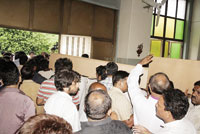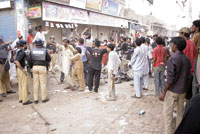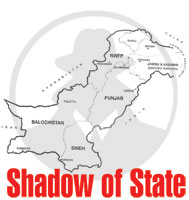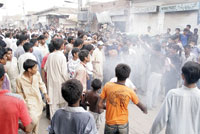By Waqar Gillani
Raashid Emanuel and Sajid Emanuel, two blasphemy accused brothers living in a lower middle-class suburb of Faisalabad, were shot dead by an unknown assailant on July 19 morning only 18 days after a case was registered against them.
Till before their death, police was investigating to prove the charges, and the two accused had not confessed issuing blasphemous remarks printed in a phamphlet, according to senior investigator Muhammad Hanif.
The attacker -- still untraced by the police -- targeted the brothers a few yards away from the courtroom of senior civil judge at the highly guarded district courts in Faisalabad when a police officer was escorting them back to the jail.
"The attacker was a young man clad in lawyer's uniform – white shirt and black pants. He ran towards the rear side of the court building after the attack," says eyewitness Asad Ali, 42, a rickshaw driver, while showing bloodstains of the victims and bullet marks on the court's corridors walls a day after the incident. "Many people saw him running, but nobody dared catch him because he was carrying a gun. The police inspector tried to chase him but he was also shot and injured by the attacker," he adds.

Towards the end of June, according to police investigators, one man called Bilal found a blasphemous pamphlet, carrying derogatory remarks against Prophet Muhammad (PBUH) and preaching Christianity. The two-page handwritten pamphlet surprisingly contained the names of two accused brothers and their contact numbers. "Somebody threw this handwritten pamphlet in Bilal's lap while commuting in a public transport bus coming to Faisalabad," a police investigator tells TNS while sitting in his office in Faisalabad.
Bilal handed over this pamphlet to Muhammad Ashraf, a worker in a printing factory. Ashraf gave this to the factory manager Muhammad Khurram Shahzad, 35, who informed the clerics of the city's main mosque leading to a hue and cry in the city.
A case under section 295C of Pakistan Penal Code was lodged by Muhammad Khurram Shahzad against the two brothers on July 1. The police arrested Raashid on July 5 while his younger brother surrendered a couple of days later after the police talked to the local Christian elders. "There were protests and announcements were made from various mosques against the accused," says Joseph Coutts, Catholic Bishop of Faisalabad. "The whole episode seems to be a trap as no one dare write blasphemous content and give his phone numbers and address as well."

Coutts adds after lodging the case, some extremist groups started protesting and demanding death sentence for the accused. There were threats after the FIR was lodged, but no security was provided to them.
The poor localities of Warispura and Daud Nagar in Faisalabad -- the industrial hub and the third largest city of Pakistan -- turned into a battlefield on Monday night when riots erupted after Christians started protesting against the killing of the two brothers. Following their violent protest, the Muslims in the area allegedly vandalised shops owned by Christians and desecrated local churches. Heavy contingents of police were deployed there to control the situation.
"Many scared Christian families have fled the area," says Nadeem Masih, 35, a resident of the locality. "Police was also siding with Muslims as it blocked our rally and took no action against the Muslim rioters."

Khadim Hussain Anwar, a Muslim resident of the area, tells TNS the derogatory pamphlet was widely circulated and led to protests by Muslim youth. "Photocopies of the pamphlet were circulated through shops and mosques," says human rights activist Sabir Anthony.
Lahore High Court Chief Justice took a suo motu notice of the killing of two alleged blasphemers and ordered a judicial inquiry into the matter two days after the attack. The regional police chief accepted before the court that they failed to ensure foolproof security to the victims, the Punjab law minister also admitted this in the Punjab Assembly session last Wednesday.
Muhammad Khurram Shahzad, the complainant in the case, has 'disappeared' after the incident. "I had no personal grudge against the brothers. I just got a pamphlet from my clerk and handed it over to authorities for a fair probe, and it was the police's job to look into it," he tells TNS on phone. "Authorities have advised me not to disclose my location as the situation is very tense. A week after the case was lodged, a Tehrik-e-Hurmat-e-Rasool (THR) delegation came to me, saying that henceforth they would follow the case. I don't know what happened after that."
THR is an alliance of different religious parties with Jamaatud Dawa (JuD) on the forefront. The movement for the past few months has been campaigning against Facebook after alleged blasphemous content.
A high-up of THR, asking not to be named, expressed ignorance about any meeting with Shahzad. "The protests started only after Christians held a violent protest and these protests were not held by any particular organisation. It was a spontaneous reaction by the local Muslim community," the THR official maintains.

Following the tension, police have lodged a case against around 800 Christians to pacify the charged Muslim community. "There are a few persons who always spread hatred against Christians in the area," says Iftikhar Masih, 29. "Hate speech is common against us. We think that Sipah-e-Sahaba Pakistan and Tehrik-e-Hurmat-e-Rasool are the groups that stoked violence. Some shops and mosques had also been distributing cassettes of hate speeches against us."
Father of the victims, Emanuel is a retired low grade government officials. He has left the area along with his three sons and one daughter. Rashid Emanuel was married a year ago and was a pastor running a prayer group in the area. His younger brother Sajid was doing MBA. "We have no enmity. My brothers always denied this allegation," says a scared Sajan Masih, elder brother of the victims, while talking to TNS from a safe place. "We demand justice."
Police are still clueless about the killer and equally ignorant about the provocative speeches and protests in the area and distribution of pamphlets.
Handwriting expert's report to confirm if the pamphlet's writing samples matches the victim's writing is still awaited, an investigator tells TNS requesting anonymity.
Rana Ahmad Hassan, Senior Superintendent Police (investigations) and acting operational chief of Faisalabad, has nothing to add. "Why are you asking about the investigations? Don't you know this is a sensitive case? I cannot share anything with you," he tells TNS.


